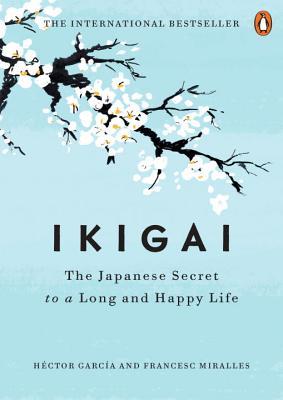
Ikigai: The Japanese Secret to a Long and Happy Life
Héctor García, Francesc Miralles, Heather Cleary
About the Author

Héctor García
Questions & Answers
Ikigai is a Japanese concept that translates to "the happiness of always being busy" or "finding one's reason for being." It represents the intersection of what one loves to do, what one is good at, what one can be paid for, and what the world needs. This sense of purpose contributes to longevity and happiness in several ways:
- Purpose and Meaning: Ikigai provides individuals with a sense of direction and fulfillment, which is crucial for mental well-being and longevity.
- Active Lifestyle: Those with a clear ikigai often remain active, even after retirement, which is beneficial for physical health.
- Community and Social Connections: Ikigai often involves community engagement, fostering social connections and support, which are linked to longer life and happiness.
- Stress Reduction: Engaging in activities aligned with ikigai can reduce stress, which is a significant factor in aging and health.
- Healthy Habits: The pursuit of ikigai can lead to healthier lifestyle choices, such as diet and exercise, further enhancing longevity.
In essence, ikigai is a powerful tool for creating a meaningful life, which in turn promotes both longevity and happiness.
To discover your Ikigai and apply it to daily life, follow these steps:
- Reflect on Your Passions: Consider what activities you enjoy and feel fulfilled by. These could be hobbies, work, or helping others.
- Identify Your Values: What is important to you? This could be family, community, or personal growth.
- Assess Your Skills: What are you good at? Aligning your Ikigai with your skills can increase your satisfaction.
- Seek Feedback: Ask friends and family what they think you are good at and what you enjoy doing.
- Experiment: Try new activities and hobbies to discover what resonates with you.
- Integrate Ikigai into Daily Life: Incorporate your Ikigai into your daily routine, whether it's through work, hobbies, or social interactions.
- Maintain Balance: Ensure your Ikigai doesn't consume all aspects of your life. Balance is key to a fulfilling life.
- Embrace Challenges: Use obstacles as opportunities to grow and refine your Ikigai.
- Stay Open-Minded: Be willing to adjust your Ikigai as you grow and change.
- Share Your Ikigai: Engaging with others who share your interests can enhance your experience and provide support.
The key factors contributing to longevity in Blue Zones, such as Okinawa, are diet, exercise, purpose (Ikigai), and social connections. These factors are interconnected and relate to Ikigai in the following ways:
-
Diet: Blue Zones inhabitants consume diets rich in vegetables, fruits, whole grains, and fish, with moderate calorie intake and limited meat and processed foods. This aligns with the Japanese concept of "Hara hachi bu," eating until 80% full, which promotes longevity.
-
Exercise: Regular, low-intensity movement like walking and gardening is common in Blue Zones, promoting physical health. This movement is consistent with the Japanese philosophy of Ikigai, which emphasizes staying active and engaged in life.
-
Purpose (Ikigai): Finding a sense of purpose and meaning in life is a central aspect of Ikigai. Blue Zones residents often have strong community ties and a sense of belonging, which contributes to their happiness and longevity.
-
Social Connections: Strong social networks, like the Japanese "moai," provide emotional and financial support, reducing stress and promoting longevity. This is a direct reflection of Ikigai, which emphasizes the importance of community and relationships.
In summary, the longevity in Blue Zones is achieved through a combination of healthy lifestyle choices, a strong sense of purpose, and social connections, all of which are deeply rooted in the concept of Ikigai.
Japanese centenarians maintain their health and happiness through a combination of lifestyle factors and a strong sense of purpose, known as "ikigai." They follow a diet rich in vegetables, fruits, and fish, adhering to the "Hara hachi bu" principle of eating until 80% full. They engage in regular, moderate exercise, such as gardening and tai chi, and maintain a strong sense of community and social connections, often participating in groups called "moai." They prioritize relaxation and mindfulness, practicing stress-reduction techniques like meditation and maintaining a positive outlook. Their longevity can be attributed to their active lifestyle, balanced diet, social connections, and a clear sense of purpose. We can learn from them by focusing on a healthy diet, regular exercise, social engagement, stress management, and finding our own ikigai to give our lives meaning and purpose.
Resilience and the concept of wabi-sabi are crucial in achieving a long and happy life. Resilience allows individuals to face life's challenges with a positive outlook and adaptability, focusing on what they can control and not being overwhelmed by setbacks. This emotional strength is enhanced by practices like Buddhism and Stoicism, which teach controlling negative emotions and embracing the present moment.
Wabi-sabi, a Japanese philosophy, appreciates the beauty in imperfection and impermanence, encouraging a serene acceptance of life's transient nature. This perspective helps individuals find joy in the present and appreciate the fleeting moments of life, reducing stress and worry. Together, resilience and wabi-sabi promote a balanced, contented life, fostering longevity and happiness.